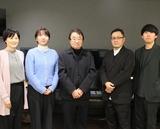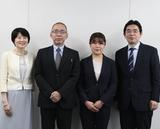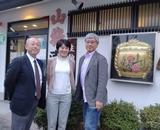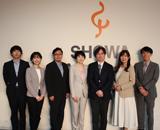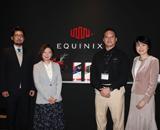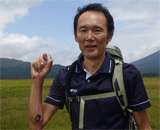February 2019
Using Plain English as the Starting Point for Creating Suntory's Country-Specific Websites in Local Languages
"Yatte Minahare!" Dream big, take challenges, and never give up. So goes the motto of Suntory founder Shinjiro Torii, which has now become the driving force behind the company's growth. It is with this spirit in mind that Suntory Holdings Corporate Brand Strategy Department, together with local group companies, are preparing for the launch of new global websites, customized for each country. The first to be developed is the website for Vietnam. At Arc Communications, we handled the English and Vietnamese translations for this website. The website, which will feature both English and Vietnamese pages, will be used to share information with local staff members, as well as to prepare for the development of the other global websites. The translation to Vietnamese was done from plain English. Indeed, this project purposefully incorporates plain English--something many still find difficult to define--and uses it as a base from which to branch out into various other languages, a methodology that seems to embody the "Yatte Minahare" spirit that Suntory is known for.
From left to right:
Masanori Itoh, Kimberley Morgan, Emi Otsuka, Mariko Ohsato, Taro Aikawa and Hiroaki Baba
- Profile
- Taro Aikawa: Manager, Corporate Brand Strategy Department, Suntory Holdings Limited
- Emi Otsuka: Acting Manager, Corporate Brand Strategy Department, Suntory Holdings Limited
- Mariko Ohsato: CEO & President, Arc Communications Inc.
- Hiroaki Baba: Translation & Localization Division, Executive Manager, Arc Communications Inc.
- Masanori Itoh: Chief Project Manager, Translation & Localization Division, Arc Communications Inc.
- Kimberley Morgan: Project Manager, Translation & Localization Division, Arc Communications Inc.
Promoting Suntory to the World
Ohsato: We're very honored to work with you on the translation of your country-specific websites. Could you tell us first about how your company sees this project, and the strategy you have for it?
Aikawa: To give a brief explanation: Suntory, since the start of the 21st century, has used M&As to accelerate its global development and work toward future growth, and has gradually acquired more and more overseas sites. With this, we started feeling the need to establish Suntory as a trustworthy and reliable brand overseas as well.
Ohsato: It's interesting, because in Japan there's probably not a single person who hasn't heard of Suntory...
Aikawa: Actually, there are a lot of people overseas who see our company name or a product of ours and have no idea what Suntory is. So the first thing we did was to create a base for English communication--a global website and global social media accounts. But we realized that this wasn't enough to convey all the information we wanted to, considering each country has their own local situations and particularities. Some of our businesses are also located in countries where English isn't the native language. So in 2017, in order to get information to local areas in a way that's suited to each country, we started this project for country-specific corporate websites.
Ohsato: But you decided against simply translating the existing global website into different languages.
Aikawa: The global website didn't have enough locally-oriented information, and also--depending on the country--just had a lot of irrelevant information, because it had information from all around the world. This project began when we decided that these would be entirely new websites, made specifically in collaboration with local companies in each of the countries. And the first of these was the Vietnam-oriented project we worked on.
Multi-Lingual Development, Starting with Vietnam
Ohsato: Why did you decide to start with Vietnam?
Aikawa: We first narrowed it down to countries where we had a certain level of sales, and where we could expect future growth. Then we thought over the cultural and social backgrounds of each of our options, and it seemed Vietnam was the one that best fit our requirements. Oh, and because the challenge was for translation in a new language, one of the requirements was that the country couldn't have English as their official language.
Ohsato: It's natural that a website for Vietnam would be in Vietnamese, but why did you also want English on this website?
Otsuka: There were two reasons. One was that this was a project with local staff members, and we needed English as a common language. If it was only in Vietnamese, we wouldn't have been able to understand or approve the content as it was being produced. We also knew we'd need English for when we spoke to representatives in other countries about the completed Vietnamese website. The second reason was that in Asia, high-level executives are sometimes not from the areas they represent, and so we felt an English website was very important.
The Challenge of Plain English
Ohsato: You were very clear about wanting to use plain English for the English translation. How did you come about this decision?
Otsuka: One reason was that we wanted to make the English easy to understand, since there was a chance that the people reading it wouldn't be native English speakers. The other was that we wanted to create a base text of simple, easy-to-understand English, since we knew it would be translated into multiple languages afterwards. And, maybe you've forgotten, but it was actually you who first introduced us to the concept of plain English (laughs).
Ohsato: Oh, really (laughs)? Plain English, as the name suggests, is just simple, easy-to-understand English. The concept comes from the U.K. and the U.S., where it was used in government texts to make them understandable to a wider array of people. The definition of it has actually expanded nowadays to mean "English that non-native English speakers can easily understand." What was your experience working with plain English for this project?
Otsuka: It was very easy to understand, and I think the translation overall was very good, and well-built for further translation into various other languages. But I think what we realized on our side was that it wasn't just about the process of converting English to plain English. The most important thing, which we began to realize through our discussions with Arc, was how "plain" we wanted the plain English to be.
Ohsato: The definition of plain English as "being understandable to anyone" is well-understood, but the how of it, and the details of its execution, are not clearly defined. There are a few styles of plain English, and I think one of our challenges in this project was to figure out exactly what kind of plain English was the right fit for Suntory.
Otsuka: It did feel like this portion of the project took a very long time, but because of it, your company was able to provide us with a set of detailed guidelines, which we can use for consistent translations in the future. We're very grateful.
Ohsato: On our side, Kimberley was in charge of overseeing this project. What direction did you take for the project?
Kimberley: At first we took a flat plain English approach to all of the text. But then we received feedback from Suntory, saying they would prefer, especially for the parts with a stronger message, if we didn't do away with the passion that they wanted to convey in the text. So we went in with small adjustments--holding back on the plain English in parts with a strong message, so as not to lose the nuance and richness in the language.
Feature Interview Index

